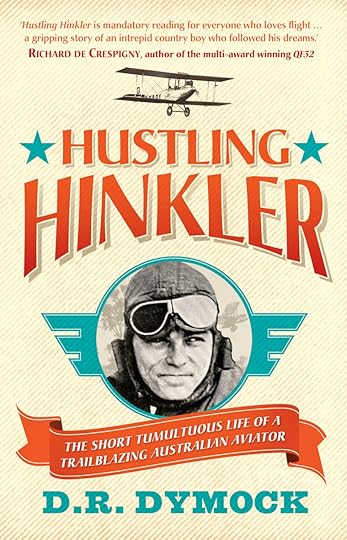Interview with DR Dymock, author of ‘Hustling Hinkler’
Back in 2010, when I was part of the Hachette/Queensland Writers Centre manuscript development programme, there was one man in our group – Darryl Dymock. He was unique, not only because the rest of us were women, but because he was the only one of us who was writing non-fiction. And last week, his manuscript was published by Hachette Australia. I’m so thrilled to be interviewing Darryl about his experiences as a writer and his new book!
Oh, and like Darryl, I’m still not sure I know what steam-punk is either…

1. Congratulations on the publication of Hustling Hinkler! Can you tell us a little about the book?
Hustling Hinkler tells the intriguing story of Bert Hinkler, a country boy from Bundaberg in Queensland, who became a world-famous long-distance flier, and tragically lost his life at the age of just 40 when he crashed on a snow-covered mountainside in Italy in 1933. Although he was a brilliant pilot and the ‘hero of the day’, as a popular song of the time labelled him, he was also a complex person who struggled to find a place for himself in a rapidly changing world. Not to mention the three grieving women he left behind…
2. The manuscript for Hustling Hinkler was selected for the 2010 Hachette/QWC Manuscript Development Programme. What were some of the important things you learned from this?
• How much work on my book I still needed to do – as I said in a recent blog: ‘I almost cried, I damn near died.’
• How exciting and encouraging it is to be with other dedicated, passionate and supportive writers and tutors
• No matter how good a writer you are, the most important question for a publisher is: Is there a big enough market for your book?
• There’s a literary genre called ‘steampunk’, which I’m still not sure I understand.
3. You are a very experienced writer: you have previously written award-winning short stories (fiction), published a non-fiction title (Extending Your Use-by Date), and are an academic. How did the writing process for Hustling Hinkler, which is narrative non-fiction, differ from the other writing you have done?
In academic writing, we are reporting on our research, and in the field of education we recognise that we are dealing with aspects of human behaviour, which means there are lots of variables. So we tend to shy away from absolutes – we use phrases like ‘tend to’! Our conclusions are hedged with ‘possibly’ ‘it seems’, ‘is is likely that’. Passive voice is favoured because it is believed to be more objective (see how easily I slipped into it in this sentence), and we don’t use contractions. The audience is restricted to other academics and education professionals. Writing Hustling Hinkler drew on the same skills of research and analysis, but I knew I was writing the book for a general readership, so I needed to balance telling his remarkable story with providing sufficient historical context for readers to be able to appreciate the wider world in which he lived. And in narrative non-fiction, as in any good story, active voice reigns supreme, so I had to continually scan to make sure I didn’t slip into the passive.
4. What has been the most enjoyable part of the publication process for you? Has anything surprised you?
• The satisfaction of finally getting it right – hearing from Vanessa Radnidge at Hachette Australia that she thought the latest rewrite was ‘fantastic’
• Signing my first publishing contract
• Seeing the awesome cover online for the first time
• Receiving an advance hard copy of the book in the mail
• Getting lots of encouragement from the people at Hachette and support from other writers, friends and family
• Receiving a generous endorsement pre-publication from Richard De Crespigny, Qantas pilot and author of the multi-award winning non-fiction book, QF32.
• Rubbing shoulders with other authors and feeling that I can legitimately join that band.
Surprises? How thorough the external editor of Hustling Hinkler was, and what goes on behind the scenes before the book is published, especially in pre-promotion.
5. What does the future hold for you as a writer?
• I think I have now found my ‘voice’ in narrative non-fiction, and hope that I can continue to be published in that genre. I’m working on a second book.
• I like the discipline of writing fiction short stories, and although I’ve been successful with a couple of them, I want to further develop my skills in that field.
• My original exploration of Bert Hinkler’s life was through a still unpublished young adult novel, and I’ve received enough professional encouragement of that manuscript for me not to abandon it completely – though it’s still in the bottom drawer.
• I’ll continue with my academic writing while I’m still working in that field. Interestingly, I think my use of language in that area has improved as a result of writing Extending your use-by date and Hustling Hinkler, and I’ve even managed to squeeze a bit more active voice into those fascinating academic journal articles.
You can read more about Darryl on his website. You can buy his book, Hustling Hinkler, from your local bookshop, or online, and it’s also available as an e-book from the usual places.




